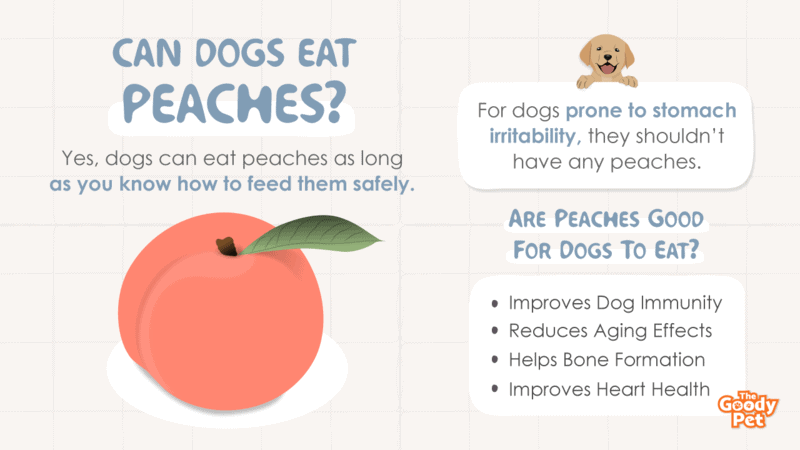Peaches are great summer fruits, and we can’t just get enough of them. It isn’t only because they are juicy, but because they contain several nutrients. Knowing this, you may wonder if these summer fruits are beneficial to your four-legged friends, and more importantly, can dogs eat peaches?
Dogs can eat peaches as long as you know how to feed peaches to them safely. The fruit is highly nutritious to your canine buddy. One primary reason dogs should eat peaches is that they improve heart health due to their potassium content.
Dogs are primarily carnivores, so feeding them fruit such as peaches requires some caution. While peaches are safe for dogs, there could be downsides to feeding your dog fruit. We don’t want your dog to miss out on this fleshy fruit, so we’ll detail how to safely feed dogs peaches. Keep reading to learn the amazing benefits of peaches for dogs.
Are Peaches Safe For Dogs?

Peaches are an excellent source of vitamins and other nutrients necessary for the all-around health of your canine buddy.
Some nutrients in peach fruit include vitamins A and B, magnesium, phosphorus, potassium, copper, riboflavin, and fluoride. Ripe peach fruit is also soft enough for your dog to munch, so there is no risk of injuring their teeth or gums when chewing.
Moreover, your dog can eat a peach without any repercussions since the fruit is naturally safe. You only have to serve uncontaminated ones, mind the number your dog eats, and avoid serving the unhealthy parts, namely the pit and stalk.
How Many Peaches Can A Dog Eat?
Large dogs should not have more than one peach a day. Small dogs should have not more than two slices a day.
The idea is to serve peaches in moderation since too much fruit can lead to digestive problems and obesity. If your dog is new to eating peaches, start with a small quantity. One or two slices would do to start.
Meanwhile, ensure to ask your vet about giving your furry friend peaches. If your dog is prone to stomach irritability, you shouldn’t give your canine buddy any peaches.
How To Safely Serve Peaches To Dogs
To prepare peaches for dogs, detoxify them, and serve them in the correct proportion. You can safely feed your dog peaches by following these steps:
- Buy only organic peaches for your dog. Buying organic minimizes the presence of chemicals. When possible, buy directly from farms to minimize the presence of chemical preservatives.
- Wash the fruit under running water and dry with a towel. Do not use vinegar to wash the fruit as your dog may be sensitive to it.
- Peel off the skin if you suspect the fruit has any chemical treatment like preservatives. Make an incision with a knife and put the peach in hot water. This makes the skin easier to remove.
- Cut open the fruit and remove the peach stone.
- Dice the fruit into small bits that your dog can eat.
- Serve in moderation as a salad with other fruits, or make it into a smoothie.
- Serve only occasionally, not every day.
As a precaution, never serve your doggy canned peaches since they would certainly contain preservatives. Also, ensure you observe your dog before and after eating this summer fruit, even if it isn’t the first time you’ve fed your dog peaches.
Are Peaches Toxic To Dogs?

Generally, peaches are non-toxic to dogs, but peaches can be toxic if your dog eats too much or if the fruit is moldy.
Peach fruit is sweet, so your canine friend would love to gobble on several. However, the relatively high sucrose content puts your dog at risk of dental problems and unwanted weight gain. In controlled quantities, your dog will likely not experience problems eating peaches.
Again, make sure your dog eats freshly plucked fruit from the farm. If you must pick from the ground, inspect the fruit thoroughly to ensure it is free of mold. Moldy peaches have spores that are toxic to dogs and could cause respiratory challenges when ingested.
Why Are Peaches Toxic To Dogs?
Generally, peaches are toxic to dogs if unripe or if they contain chemicals from farms or storage.
Chemical herbicides and pesticides are often used on fruit farms. Peaches may absorb these chemicals through their skin. If you feed such fruit to your dog, there would be undesirable consequences.
Unripe peaches are not healthy for your dog. Unripe peaches contain solanine, which could cause gastrointestinal and neurological conditions in dogs.
Peach pits are the most dangerous to dogs since dogs may swallow them and choke. Not only that, peach pits or stones are dense in cyanogenic content known as amygdalin. This compound inhibits oxygen circulation in the blood, leading to suffocation, cardiac arrest, and death. If your furry friend ingests a peach pit, the substance breaks down to become a toxin.
Can Dogs Eat Peaches With Skin?
You can freely give your dog peaches with skin if you are sure the skin is not contaminated.
Peaches have thin skin that does not pose any problem to your Fido’s teeth. Besides, the skin contributes the most to the fruit’s fiber content. Research also shows that peach skin contains about twice the concentration of antioxidants as other parts of the fruit. Why waste so many nutrients?
However, feeding dogs peach skin can be dangerous if the fruit is from farms using chemicals on plants, such as pesticides and herbicides. If these synthetic compounds are present on the skin, they can lead to poisoning.
Are Peaches Good For Dogs To Eat?
Peaches are excellent sources of nutrients and minerals for your furry buddy. Considering these nutrients, some benefits of peaches to dogs include the following:
Improves Dog Immunity
Minerals and vitamins are invaluable to building a robust immune system in dogs. Thankfully, peach fruit contains six of the seven recommended vitamins and minerals most vital for your dog’s health. These include vitamins A, B, C, D, E, and K.
Hence, peaches are excellent supplements for dogs, preventing diseases and keeping them healthy.
Reduces Aging Effects
Peach fruit is rich in antioxidants, such as vitamins C and E. There is proof that these antioxidants help dogs’ brain performance. Experiments show that dogs with antioxidant diets are more mentally alert even when old. These vitamins are also part of the vet prescriptions for brain enhancement in furry canines.
Vitamin C also minimizes the occurrence of diseases associated with senior dogs, such as dysplasia and degenerative joint disease.

Repairs Dog Tissues
The presence of vitamin K in peach fruit is invaluable to the body when the dog has a cut. The nutrient makes blood clotting possible. Meanwhile, vitamin C is a general prescription for wound healing in dogs. These nutrients are generously available in peach fruit.
Helps Bone Formation
Unfortunately, there isn’t any calcium in peaches. However, that’s not the only mineral essential for bone formation and strength. Vitamins C, E, and K are equally necessary for your dog to have healthy and strong bones.
Vitamin C produces collagen for the bone matrix, vitamin E averts cellular damage, and vitamin K improves bone density. Luckily, these three minerals are generously available in peaches.
Improves Heart Health
Peach fruit supplies an 8% daily value of potassium, an essential nutrient that reduces the risk of high blood pressure in dogs. The potassium-rich fruit removes excess sodium from the body to reduce pressure on the blood vessels. Besides, this nutrient also helps the heart muscle move and work well during blood pumping.
Aids Digestion
We know that fiber is a vital nutrient for dogs’ digestive systems. A medium-sized peach of 5.4 oz contains 0.07 oz of fiber. Fiber helps dogs maintain a healthy gastrointestinal tract and enhance bowel movements.
Moreover, fermented fiber is converted to fatty acids by beneficial bacteria in the intestine. Fatty acids also combat the growth of unhealthy bacteria.
It is also a medical fact that fiber alleviates symptoms of constipation and diarrhea. Insoluble fiber absorbs moisture from the colon to the dog’s stool, making it easier to poop.





